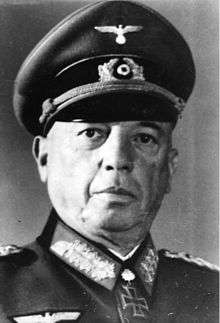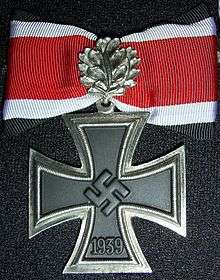Georg von Küchler
| Georg von Küchler | |
|---|---|
 Georg von Küchler | |
| Born |
30 May 1881 Hanau, German Empire |
| Died |
25 May 1968 (aged 86) Garmisch-Partenkirchen, West Germany |
| Allegiance | |
| Years of service | January 1900 – 1944 |
| Rank | Generalfeldmarschall |
| Commands held | |
| Battles/wars | World War II: Battle of the Netherlands, Battle of France, Siege of Leningrad |
| Awards | Knight's Cross of the Iron Cross with Oak Leaves |
Georg Karl Friedrich Wilhelm von Küchler (30 May 1881 – 25 May 1968) was a German Field Marshal and war criminal during the Second World War. He was a recipient of the Knight's Cross of the Iron Cross with Oak Leaves.
After the end of the war he was tried in the High Command Trial, as part of the Subsequent Nuremberg Trials. On 27 October 1948 was sentenced to twenty years' imprisonment for war crimes and crimes against humanity committed in the Soviet Union. He was released in 1953.
World War I and interwar years
Born in 1881, Küchler entered the Imperial Army in 1900. He studied at the Prussian Military Academy, before joining the General Staff in Berlin in 1913. During World War I he commanded an artillery battery on the Western Front and then became a staff officer of an infantry division. In 1919 he joined the Freikorps and fought the Red Army in Poland. Promoted to colonel, Küchler became deputy commander of the 1st Infantry Division in East Prussia in 1932. In 1938 he supported Adolf Hitler in his removal of Werner von Blomberg and Werner von Fritsch from power.
World War II
Poland and Western campaign
On the outbreak of the World War II, Küchler assumed command of the 3rd Army. During the invasion of Poland, Küchler’s troops captured Danzig. In 1940 he was supportive of Nazi racial policy and ordered on 22 February a halt to any criticism of "ethnic struggle being carried out in the General Government, for instance that of the Polish minorities, of the Jews and those regarding Church matters". His order explained that the "final ethnic solution" required unique and harsh measures.[1]
In the Western campaign he fought under Field Marshal Fedor von Bock. His 18th Army invaded the Netherlands, fighting at Moerdijk, Rotterdam, and the Hague. Küchler’s forces took Antwerp on 18 May 1940 and then moved into France, attempting to cut off the British Expeditionary Force (BEF) from the English Channel at Dunkirk, which ended in failure. The 18th Army ended this phase of the war at Pas de Calais.
Küchler was an active supporter of the planned war of annihilation (Vernichtungskrieg) against the Soviet Union. After meeting Hitler in March 1941 to plan for Operation Barbarossa, Küchler told his divisional commanders on 25 April 1941:
"We are separated from Russia, ideologically and racially, by a deep abyss. Russia is, if only by the mass of her territory, an Asian state...The Führer does not wish to palm off responsibility for Germany's existence on to a later generation; he has decided to force the dispute with Russia before the year is out. If Germany wishes to live in peace for generations, safe from a threatening danger in the East, this cannot be a case of pushing Russia back a little-or even hundreds of kilometers-but the aim must be to annihilate European Russia, to dissolve the Russian state in Europe"[2]
Küchler went on to call Red Army commissars "criminals" who should all be shot.[3]
Eastern Front
During Barbarossa, the 18th Army forced its way to Ostrov and Pskov after the Soviet troops of the Northwestern Front retreated towards Leningrad. On 10 July 1941, both Ostrov and Pskov were captured and the 18th Army reached Narva and Kingisepp, from where advance toward Leningrad continued from the Luga River line. This had the effect of creating siege positions from the Gulf of Finland to Lake Ladoga, with the eventual aim of isolating Leningrad from all directions. The Finnish Army was then expected to advance along the eastern shore of Lake Ladoga.[4] Küchler was directly involved in the murder of mental patients. In December 1941, with his express consent, units of the SD shot 240 mental patients.[5]
On 17 January 1942, Küchler succeeded Field Marshal Wilhelm Ritter von Leeb as commander of Army Group North after the latter was relieved of command. Küchler was seen as politically compliant and was liked by Adolf Hitler, who hoped that Küchler would succeed where he believed Leeb had failed. Küchler commanded Army Group North from December 1941 through January 1944, maintaining the siege of Leningrad. On 30 June 1942 Hitler promoted Küchler to field marshal (Generalfeldmarschall). In January 1944 Soviet troops broke the siege, and Küchler was sacked when he demanded the withdrawal to the Luga River. While in retirement Küchler was approached by Carl Goerdeler who tried to persuade him to join the July Plot. He refused to participate in the attempt to assassinate Hitler.
Trial and conviction
At the end of the Second World War, Küchler was arrested by American occupation authorities. He was tried in the High Command Trial, as part of the Subsequent Nuremberg Trials. In his testimony regarding the crimes against the Soviet prisoners of war, Küchler admitted that the conditions in the POW camps were harsh, but insisted that the main cause of that was the winter conditions of 1941–42, which he called an "act of God" and insisted that the army exaggerated POW mortality in their reports in an effort to receive more supplies for the prisoners.[6]
On 27 October 1948 Küchler was sentenced to twenty years' imprisonment for war crimes and crimes against humanity committed in the Soviet Union. The sentence was reviewed in 1951 and reduced to 12 years. He was released 1953 on medical grounds.[7] Küchler died in 1968.
Awards
- Iron Cross (1914)
- Clasp to the Iron Cross (1939)
- Knight's Cross of the Iron Cross with Oak Leaves
- Mentioned twice in the Wehrmachtbericht (21 October 1941 and 12 August 1943)
Citations
- ↑ The Origins of the Final Solution Christopher R. Browning, Jürgen Matthäus page 79 University of Nebraska Press, 2007
- ↑ Förster, Jürgen "The German Military’s Image of Russia" pp 117–129 from Russia War, Peace and Diplomacy edited by Ljubica and Mark Erickson, London: Weidenfeld & Nicolson, 2004 page 125.
- ↑ Förster, Jürgen ”The German Military’s Image of Russia” pp 117–129 from Russia War, Peace and Diplomacy edited by Ljubica and Mark Erickson, London: Weidenfeld & Nicolson, 2004 page 125.
- ↑ Хомяков, И (2006). История 24-й танковой дивизии ркка (in Russian). Санкт-Петербург: BODlib. pp. 232 с.
- ↑ Hebert 2010, p. 95.
- ↑ Hebert 2010, p. 123.
- ↑ Hebert 2010, p. 216–217.
- 1 2 3 4 Thomas 1997, p. 421.
- ↑ Fellgiebel 2000, p. 277.
- ↑ Fellgiebel 2000, p. 71.
References
- Britannica Online Encyclopedia "Georg von Küchler".
- Hebert, Valerie (2010). Hitler's Generals on Trial: The Last War Crimes Tribunal at Nuremberg. Lawrence, Kansas: University Press of Kansas. ISBN 978-0-7006-1698-5.
- Fellgiebel, Walther-Peer (2000) [1986]. Die Träger des Ritterkreuzes des Eisernen Kreuzes 1939–1945 — Die Inhaber der höchsten Auszeichnung des Zweiten Weltkrieges aller Wehrmachtteile [The Bearers of the Knight's Cross of the Iron Cross 1939–1945 — The Owners of the Highest Award of the Second World War of all Wehrmacht Branches] (in German). Friedberg, Germany: Podzun-Pallas. ISBN 978-3-7909-0284-6.
- Scherzer, Veit (2007). Die Ritterkreuzträger 1939–1945 Die Inhaber des Ritterkreuzes des Eisernen Kreuzes 1939 von Heer, Luftwaffe, Kriegsmarine, Waffen-SS, Volkssturm sowie mit Deutschland verbündeter Streitkräfte nach den Unterlagen des Bundesarchives [The Knight's Cross Bearers 1939–1945 The Holders of the Knight's Cross of the Iron Cross 1939 by Army, Air Force, Navy, Waffen-SS, Volkssturm and Allied Forces with Germany According to the Documents of the Federal Archives] (in German). Jena, Germany: Scherzers Miltaer-Verlag. ISBN 978-3-938845-17-2.
- Thomas, Franz (1997). Die Eichenlaubträger 1939–1945 Band 1: A–K [The Oak Leaves Bearers 1939–1945 Volume 1: A–K] (in German). Osnabrück, Germany: Biblio-Verlag. ISBN 978-3-7648-2299-6.
External links
- US Military Tribunal Nuremberg (1948). "High Command Trial, Judgment of 27 October 1948" (PDF). Retrieved 30 May 2016.
| Military offices | ||
|---|---|---|
| Preceded by none |
Commander of 1. Infanterie-Division October 1, 1934 – April 1, 1935 |
Succeeded by Generalleutnant Walther Schroth |
| Preceded by none |
Commander of 3. Armee September 1, 1939 – November 5, 1939 |
Succeeded by none |
| Preceded by none |
Commander of 18. Armee November 5, 1939 – January 16, 1942 |
Succeeded by Generaloberst Georg Lindemann |
| Preceded by Generalfeldmarschall Wilhelm Ritter von Leeb |
Commander of Heeresgruppe Nord January 17, 1942 – January 9, 1944 |
Succeeded by Generalfeldmarschall Walter Model |
